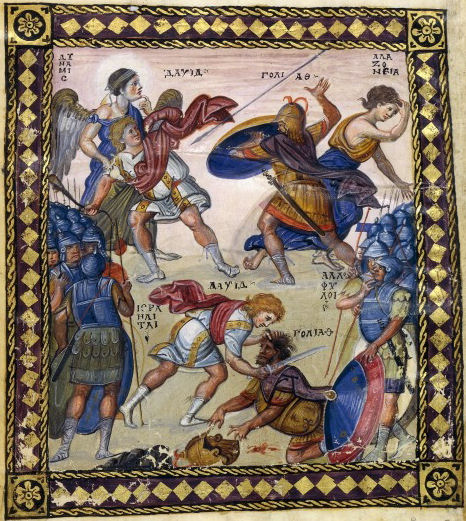 |
| Les Très Riches Heures du duc de Berry, musée Condé, ms.65, f.45v. |
Psalm 2: Quare
fremuérunt Gentes
Vulgate
|
Douay
|
Quare fremuérunt Gentes: * et pópuli meditáti sunt inánia?
|
Why have the Gentiles raged, and the people devised vain
things?
|
2 Astitérunt reges terræ, et príncipes
convenérunt in unum * advérsus Dóminum, et advérsus Christum ejus.
|
The kings of the earth stood up, and the princes met
together, against the Lord, and against his Christ.
|
3 Dirumpámus víncula eórum: * et
projiciámus a nobis jugum ipsórum.
|
Let us break their bonds asunder: and let us cast away
their yoke from us.
|
4. Qui hábitat in cælis, irridébit eos: * et Dóminus
subsannábit eos.
|
He that dwells in heaven shall laugh at them: and the Lord
shall deride them.
|
5 Tunc loquétur ad eos in ira sua, * et
in furóre suo conturbábit eos.
|
Then shall he speak to them in his anger, and trouble them
in his rage.
|
6 Ego autem constitútus sum Rex ab eo
super Sion montem sanctum ejus, * prædicans præcéptum ejus.
|
But I am appointed king by him over Sion, his holy
mountain, preaching his commandment.
|
7 Dóminus dixit ad me: * Fílius meus es
tu, ego hódie génui te.
|
The Lord has said to me: You are my son, this day have I
begotten you.
|
8 Póstula a me, et dábo tibi Gentes
hereditátem tuam, * et possessiónem tuam términos terræ.
|
Ask of me, and I will give you the Gentiles for your
inheritance, and the utmost parts of the earth for your possession
|
9 Reges eos in virga férrea, * et
tamquam vas fíguli confrínges eos.
|
You shall rule them with a rod of iron, and shall break
them in pieces like a potter's vessel.
|
10 Et nunc, reges, intellígite: *
erudímini, qui judicátis terram.
|
And now, O you kings, understand: receive instruction, you
that judge the earth.
|
11 Servíte Dómino in timóre: * et
exsultáte ei cum tremóre.
|
Serve the Lord with fear: and rejoice unto him with
trembling.
|
12 Apprehéndite disciplínam, nequándo
irascátur Dóminus, * et pereátis de via justa.
|
Embrace discipline, lest at any time the Lord be angry,
and you perish from the just way.
|
13 Cum exárserit in brevi ira ejus: *
beáti omnes qui confídunt in eo.
|
When his wrath shall be kindled in a short time, blessed
are all they that trust in him.
|
Psalm
2, the second psalm of Prime on Monday in the Benedictine Office and one of the
greatest of the Messianic psalms, has always been closely linked to Psalm 1 by
way of serving as an introduction to and summary of the entire psalter.
Psalm
1 presents us with the choice between the two ways, the truth and life that leads us
to happiness, or the way of evil that leads to destruction; Psalm 2 sets out
how that choice is manifested in history, through the Incarnation of Our Lord
on the one hand, and all those who rage against him on the other.
The Incarnation: Verse 7 is used in
the Introit and Alleluia for Midnight Mass of Christmas, and can be interpreted
as referring simultaneously to the eternal generation of the Son, his fleshly Incarnation,
and the Resurrection of Christ.
The life of Christ: The New
Testament (see for example Acts 4) repeatedly makes it clear that Psalm 2’s
plotting King’s and raging peoples particularly refers especially to Herod and
all those who plotted against and persecuted Our Lord. But it also has
an ongoing application: atheism involves a specific rejection of God, the
desire to ‘break the bonds’.
Accept discipline: The final verses
of the psalm provide a series of instructions which are cited implicitly or
explicitly in the Rule of St Benedict in various places, including to ‘serve
the Lord with fear and trembling’, and can be seen as part of the preparation
for the weekly renewal of monastic vows in the Suscipe said at Terce.
This psalm is most famous for the English setting by Handel in the Messiah:
St Alphonse Liguori:
This psalm taken in its literal sense is entirely a prophecy of the reign of Jesus Christ, as the Apostles themselves teach us in the fourth chapter of the Acts :. . . Lord, who by the Holy Ghost, by the mouth of our father David, thy servant, hath said: Why did the Gentiles rage, and the people meditate vain things: The kings of the earth stood up, and the princes assembled together against the Lord, and against His Christ; (Acts, iv. 24)....
They then continue to speak of the conspiracies that were formed against Jesus Christ by Herod and Pilate in union with the Gentiles and the Jews. In fact, certain Protestant interpreters, and even some Catholic commentators, wish that this psalm should be understood, in a literal sense, of the reign of David. But D. Xavier Mattei wisely observes that this is a novel opinion, prevailing among Protestants, and worthy of our condemnation, since we should hold to the interpretation given by holy Scripture in the Acts of the Apostles; the more so since to apply this psalm to David we must do too great violence to the text, the expression of which so clearly refers to the reign of Jesus Christ…Fr Pasch:
The victory of God's kingdom - This is a well-known and highly dramatic Messianic Psalm. St. Bernard calls it "the roaring of the Lion of Juda against his enemies." The song portrays the never-ending battle waged by hell against Christ and the kingdom of God.For more on this psalm:
Introduction to Psalm 2 in the context of Tenebrae
Psalm 2 in Tenebrae Pt 2: Why do the nations rage



